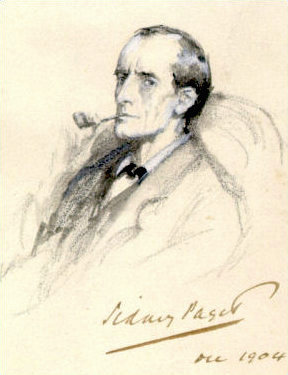Left: Johnny Lee Miller, Elementary
Right: Benedict Cumberbatch, Sherlock
Middle: Sherlock Holmes
I'll say up front: I'm not a Sherlock fundamentalist. I like the original series fine but it's not written in stone or anything. I've enjoyed many of the Sherlock adaptations, the further from the original the better-- They Might Be Giants, for example.
So I've been watching the BBC's Sherlock and NBC's Elementary. I've been struck by a couple of interesting things. I call this the Batman vs. Superman effect.

For those who have been living under a rock, Superman was born on Krypton and once reaching Earth developed god like powers intrinsic to his nature. This is important. He is born with the capacity for these powers. It only takes the power of Earth's yellow sun to bring them out.
Batman is completely different. He is traumatized by a childhood event and through his own determination and endurance trains himself up to near superhuman physical and mental abilities.
If Superman is one end of the scale and Batman is the other, where does Holmes fall?
Well, of course, that depends on the work describing him.
I'd say Doyle's original Holmes, and many of the adaptations, fall towards the Batman side of the scale though not terribly far. Holmes had trained himself to be who he was, to the exclusion of all else.. Things such as human pleasantries, the state of astronomy and possibly bathing were considered superfluous unless it was in the service of fighting crime.
(As a side note, the obsession with fighting "crime" has always seemed an odd preoccupation. I mean, didn't Superman and Batman want to fix the world? Crime's a small part of that.The original Superman comics did but then he got into more interesting material. I suppose that's the reason for all those super villains. Nothing else to do on a Saturday night but get drunk.)
Later adaptations, like that of Basil Rathbone and The Adventures of Sherlock Holmes (also BBC) seemed to stay more or less in the same range. Though very intelligent, Holmes is not Superman-- though, in some material, when contrasted with Watson he seemed to be.
Fast forward to Sherlock and Elementary.
Sherlock seems to fall squarely on the Superman side of the equation. There's all the fun lettering over things to show us what Sherlock sees or thinks-- at its level best when he's drunk. Chair: soft sqiggly thing. There's even been a couple of conversations between Sherlock and his brother Mycroft about their difficult childhood trying to fit in with normal, ungifted, people. This is contrasted to normal Watson. A nice guy who's almost always at sea with Sherlock but pursues him out of plucky friendship.
Elementary falls solidly towards Batman. The cops are a varied bunch. Some stupid. Some definitely not stupid. They recognize Holmes' "gift" for what it is-- a useful tool in police work. And Watson, though lacking training and monomaniacal dedication of Holmes, is every bit as smart-- a fact Holmes readily and repeatedly acknowledges.
Smarter, in fact. Consider Sherlock. Could Holmes and Watson ever change places? I submit that in the context of the show, Sherlock could have become as good a physician as Watson but Watson can never be the detective Holmes is.
In Elementary it's a very different game. Watson was a cardiologist-- pretty much one of the top medical professions in the country. Further, she was one of the best cardiologists. That she messed it up and left the profession is not important. She messed it up for personal, not professional, reasons. The intellectual demands on a cardiac surgeon are every bit as rigorous as being a detective-- even the best of the best, like Holmes. She left that to become a sober companion. She's left that to become a detective. A very good detective. A detective so good that she's outguessed Holmes a few times.
Contrast this with Holmes. He's a monomaniac in detection. He's very very good at that. And he has some other skills that are quite good. Yet, Watson is coming up close behind him. I suggest that Holmes could not become the cardiologist Watson was. Yet, Watson is in the process of becoming as good a detective as Holmes.
The difference between the two approaches is quite stark. It's the difference between avatar and buddha. Between attaining divinity by birth or by effort. Between aristocracy and meritocracy. Between Star Wars and Star Trek.
Hero stories often fall along this same path. As in Young Frankenstein:
Destiny!Okay. You caught me. There were no dancing girls in Young Frankenstein. But the image of a can-can being performed by Terry Garr and Madeleine Kahn still haunts me.
Destiny!
No escaping that for me!
No escaping that for me!
(cue dancing girls)
Anakin Skywalker is "destined" to bring balance to the force. Prophecies. Oracles. Etc. Or, you can have people of strength that are brought to greatness not by destiny but by their own efforts.
Or you can blend them. Then, it gets interesting.
Parzifal is destined to be great. His heritage is greatness. His strength is unmatched. His courage indomitable. His skill without peer. But he fails. Fails miserably. Fails spectacularly. Fails because he is controlled by rules instead of his compassion.
Destiny shuts him out. You only get one chance.
Parzifal refuses to accept that. And by his efforts creates a second chance where he is redeemed.
In The Stars My Destination, Gully Foyle has strength and intelligence and isn't the least bit interested in advancing himself. But then he is left for dead and the urge for payback transforms him.
It will be interesting how these two shows proceed. People seem to like the ubermensch. For my own part, I like Elementary better than Sherlock.
I've always been more fond of Batman than Superman.

_adjusted.jpg/330px-12_Years_a_Slave_38_(9730608647)_adjusted.jpg)

.png)



No comments:
Post a Comment